5 Tips to Beat Menopausal Stomach Fat That Actually Work, by Experts

Many women approaching or experiencing menopause face the challenge of sudden weight gain, particularly around the midsection. Understanding why this happens is key to tackling the issue. Dr. Mary Claire Haver, MD, FACOG, CMP, a board-certified Obstetrics and Gynecology specialist, Certified Menopause Practitioner, and Certified Culinary Medicine Specialist, shares in her popular video that as estrogen levels fluctuate, fat distribution shifts from the hips and thighs to the abdomen. This hormonal change makes it harder to maintain a flat belly. However, with the right strategies, it's possible to manage menopausal belly fat. From focusing on protein and fiber intake to incorporating aerobic exercise and intermittent fasting, Dr. Haver's expert tips offer a sustainable way to improve health and body composition during this life stage.
Here's What Is Happening to You
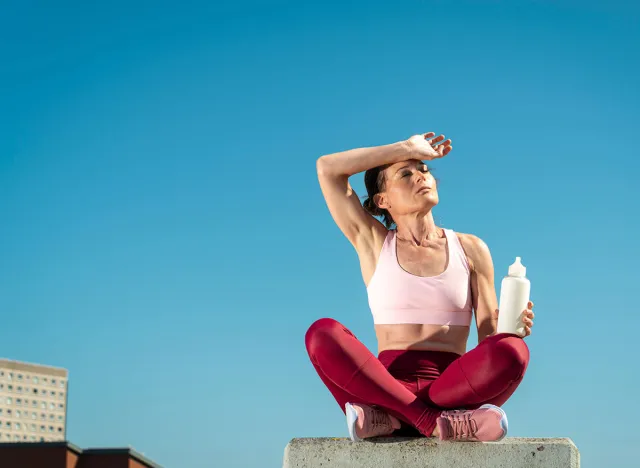
Before we jump into solutions, it's important to understand why weight gain occurs during menopause. Dr. Haver explains in her video, "As estrogen levels begin to fluctuate and drop in perimenopause, we experience a rise of active testosterone and other androgens, and the fat distribution begins to shift from the hips and thighs to the abdomen."
Dr. Kathleen Jordan, MD, adds, "Many of the hormone changes you experience as part of menopause are actually significant contributors to weight struggles. Hormone replacement therapy, if it's the right course of treatment for you, has the potential to set you up for success by improving symptoms that make it easier to gain weight and harder to lose it."
Measure Your Health Beyond the Scale
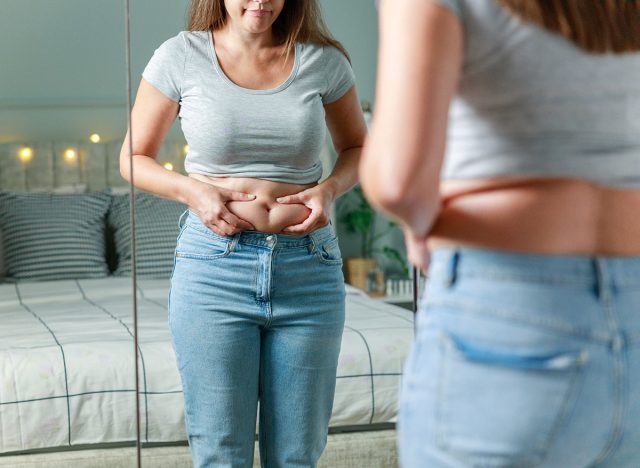
Dr. Haver emphasizes the importance of looking beyond just your weight: "Your waist-hip ratio and abdominal circumference are much more accurate indicators of health than your weight or BMI." To calculate your waist-hip ratio, measure the smallest part of your waist and the widest part of your hips, then divide the waist measurement by the hip measurement. For women, a ratio of less than 0.85 is considered healthy. You can benchmark your progress with this useful Lean Body Mass Calculator.
Tip 1: Eat More Proteins
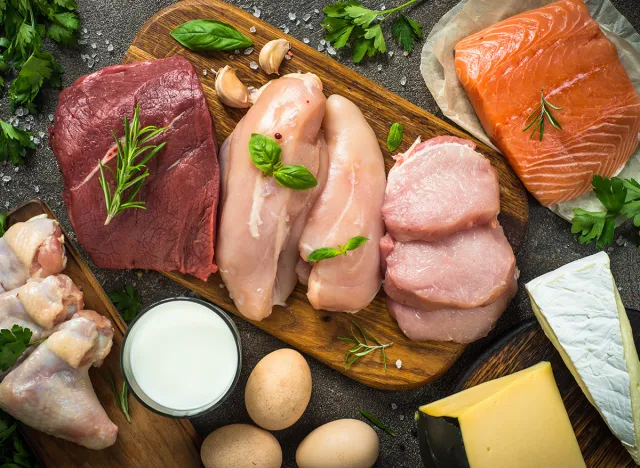
"Women, we are not getting enough protein in our diets routinely in the standard American diet," Dr. Haver states in her video. She recommends consuming 1 to 1.5 grams of protein per kilogram of lean body mass daily. This typically translates to about 70-75 grams of protein for the average woman. Dr. Haver advises, "It is important for leptin and ghrelin, the hormones that control your hunger and your satiety, that you receive protein throughout the day."
RELATED: I Lost 180 Pounds in 14 Months and These Are My 5 Non-Negotiables That Changed My Life
Tip 2: Focus on Fiber
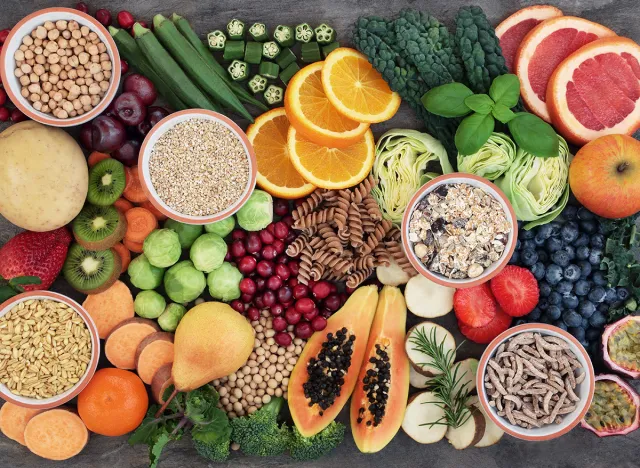
Dr. Haver in her video stresses the importance of fiber: "Fiber, fiber, fiber. Americans are not getting half of the fiber that they need." She explains that soluble fiber, in particular, is crucial as it acts as a prebiotic, feeding the beneficial bacteria in our gut. "Studies show that people who consume more soluble fiber have a lower chance of belly fat," she adds.
Tip 3: Add Probiotics
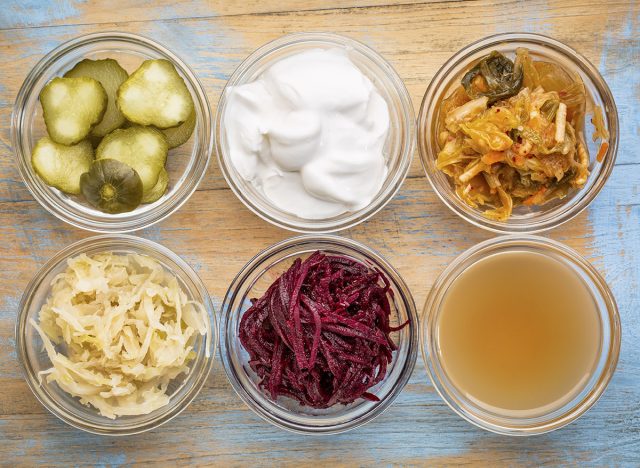
"Studies have shown that probiotic supplementation actually can reduce belly fat," Dr. Haver reveals in her video. She cites a study where "women who took the probiotic supplement lost 50% more weight than women who took a placebo." While fermented foods like yogurt, sauerkraut, and miso are excellent sources of probiotics, Dr. Haver suggests considering a supplement if you don't consume these regularly.
RELATED: 10 Anti-Aging Foods for Younger-Looking Skin You Should Eat Every Day
Tip 4: Try Intermittent Fasting
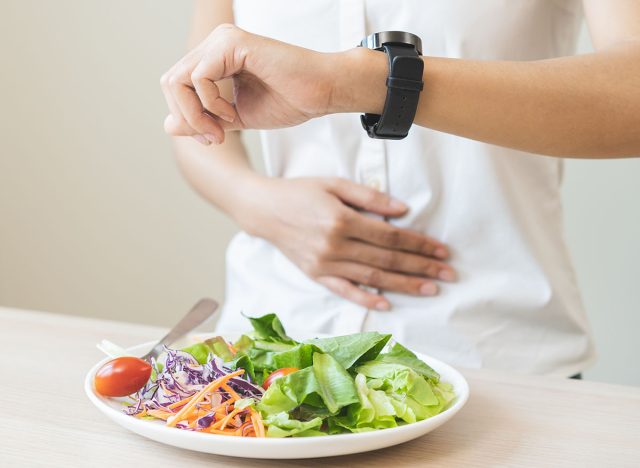
Dr. Haver in her video is a proponent of intermittent fasting, particularly a 16:8 schedule (16 hours of fasting followed by an 8-hour eating window). However, she cautions, "Intermittent fasting is not a technique that you use to wake up overnight, and you do. No, I teach our students to ease into it over five to six weeks."
Tip 5: Do Aerobic Exercise (Regularly)

"Regular aerobic activity in that max fat-burning zone" is crucial, according to Dr. Haver in her video. She recommends finding your target heart rate zone by using the formula: 220 minus your age, then aiming for 60-70% of that number. For example, Dr. Haver's fat-burning zone is between 102-120 beats per minute.
Dr. Jordan adds, "Aerobic exercise and strength training are important throughout life, especially during menopause, thanks to their cardiovascular benefits. From brisk walking to running to cycling, any activity that gets your heart rate up counts."
RELATED: 7 Realistic Tricks to Lose Arm Fat That Fitness Coach Swears By
Yes, You Can Beat Menopausal Belly Fat
Both Dr. Haver and Dr. Jordan emphasize that beating menopausal belly fat requires a comprehensive approach. Dr. Jordan says, "To lose weight and keep it off, you need to focus on different aspects of your health. Diet and exercise are important, but so are hormones, reducing stress, and getting enough sleep."
Dr. Haver, in her video, adds, "When I talk to my patients, especially those going through menopause, I remind them that this isn't about quick weight loss. It's about staying strong and healthy as you age. It's about being able to take care of yourself and feeling good in your own skin." And if you enjoyed this article, take advantage of these 20 Superfoods for People Over 50.




